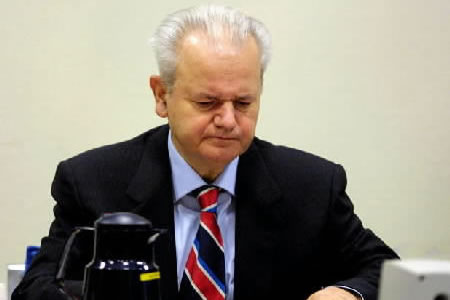Home
SUBPOENAS TO TESTIFY A "LAST RESORT"
Whatever the Appeals Chamber decides on the issue of assigning counsel to Slobodan Milosevic, it is expected that after it makes its decision, the Trial Chamber will take measures to impose the Tribunal's authority and to show that it cannot be treated as a non-governmental organization. Subpoenas are a "last resort," but the Chamber would not balk at issuing them once all other instruments have been exhausted, Judge Robinson indicates today.
 Slobodan Milosevic in the courtroom
Slobodan Milosevic in the courtroom Of 138 witnesses for the Kosovo part of the defense case deemed by Steven Kay--based on information he obtained from Slobodan Milosevic's associates—to be a priority, 65 have refused to testify and one will state his preference only after the Appeals Chamber rules on the legality of the decision to assign the accused counsel.
Those who refuse to testify in most cases quote as their reason that the accused "has been denied his right to defend himself.” Kay explained today, however, that there are those who say "they do not want to contribute to Milosevic's defense," that "they do not know anything that might help the accused," or that no one consulted them before their names got on the list of 1,600 potential defense witnesses.
As if he did not have enough problems with witnesses who refuse to appear in The Hague, a client who refuses to cooperate, and a campaign waged against him, Kay is facing yet another challenge: several witnesses who are willing to testify should get the approval of their government before actually coming to The Hague. The case of two German witnesses who were in the OSCE monitoring mission at the time relevant to the Kosovo indictment against Milosevic was discussed today. Through the Registry, Kay submitted a request to German authorities. The administrative procedure is in progress and the approvals are, it is said, "on their way." But in the meantime, one of the witnesses changed his mind and stated he would testify "only if the accused is allowed to defend himself."
It seems that there are two reasons why the Chamber has so far refrained from using the coercive measures at its disposal to bring witnesses to The Hague. According to the Rules of Procedure and Evidence, for a binding order to be issued to witnesses who were or are state officials, efforts should first be made to ensure their testimony through diplomatic channels. Judge Robinson characterized those orders today as a "last resort," noting that witnesses should be made to see "that this is a trial of fundamental importance and that the Chamber is applying due process throughout."
The second reason for the judges’ reticence is that the decision to assign counsel is before the Appeals Chamber. It will hear oral arguments on the appeal filed by Steven Kay, on Milosevic's behalf, on Thursday. Before availing themselves of the "last resort," the judges are apparently waiting for the Appeals Chamber to clear the ground by either confirming or quashing their decision to assign counsel. Judge Robinson today expressed his hope that "the situation with the witnesses might improve after the decision of the Appeals Chamber," while defense counsel Kay expressed his doubts that there would be any "improvement" if the Appeals Chamber confirms the Trial Chamber’s decision to assign counsel.
Whatever the decision of the Appeals Chamber, it is expected that the Trial Chamber will take measures to impose the Tribunal's authority and to show that it cannot be treated as if it were a non-governmental organization.
Linked Reports
- Case : Milosevic Slobodan - "Kosovo, Croatia and Bosnia"
- 2004-10-15 MILOSEVIC'S CONDUCT IS GROUNDS ENOUGH FOR THE ASSIGNMENT OF COUNSEL
- 2004-10-13 MILOSEVIC'S ALL OR NOTHING
- 2004-10-13 APPEALS CHAMBER TO HEAR ARGUMENTS ON THE ASSIGNMENT OF COUNSEL TO MILOSEVIC ON 21 OCTOBER
- 2004-10-19 DEFENSE WITNESS BEFORE A "POLITICAL TRIBUNAL"
- 2004-10-20 DUTCH LAWYER VS. DUTCH DOCTOR
- 2004-10-20 HEARING ON THE APPEAL AGAINST THE DECISION TO ASSIGN MILOSEVIC COUNSEL TO BE HELD TOMORROW
